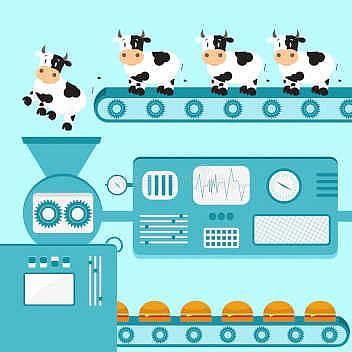เรียนจาก ⭕️ ถึง พิษออกฤทธิ์ช้าๆ
(Learning from ⭕️ to Slow Release Malady)
We have talked about patterns and Baader Meinhof psychological phenomenon that in our interest once a pattern is recognized or learned, we actually learned a class of things with that pattern. Furthermore we have inklings that patterns and learning patterns may be algorithmic. And that means we can develop programs to apply and propagate patterns. In doing so, we will come to modify them for various applications, improve them for better performance and build more structurally complex patterns using them. These are patterns in software development.
Pattern quality and access equality can come forth with 'Free and Open Patterns' (This 'Free and Open' pattern precedes the Free and Open Source Software by a few thousands of years. For examples: all religions are 'Free and and Open', most languages and pure sciences are 'Free and Open' and until recently most of Nature were Free and Open too. Education is by idealism and political promises, free and open to most children but not in reality.).

Now, let us look at ยาออกฤทธิ์ช้าๆ (Slow Release Remedy). To remedy what? Our education system? Our children? Is this one big and bitter pill that releases some of its active pharmaceutical ingredient (API) as time goes by? Is this about releases of (more complex and potent patterns) ingredients as time goes by. Does any slow release remedy design include time (as in aging and seasons), patients differences (as in sizes and habits) and their individual-environment factors?
Aren't we doing this type of things now in education in grades and years? Shall we make sure?
Let us look at situations where pilot/small projects had been very successful, but later failed spectacularly in scaling up or in pursuit of higher efficiency (mostly equate to lower cost per unit over time). Education system changes too are based on pilot results (meeting target measure). The pilot projects would be analyzed and optimized on theoretical bases. Most changes then fail (to meet or better the same target measure) after roll-out. Why?
One reason is for using unsuitable or simple linear scaling factors where complexity and logistics of the grand implementation are properly considered. Another reason is when the target measure becomes the goal. In other words, the original goal: (say) 'to educate children' is lost but 'the number of children passing the grade exam' becomes the goal of the project.
[Thailand has many classic examples of this type of failures. The ideal goal of higher education is to train students for higher skills and efficiencies. But the actual goal now is to obtain a piece of paper. And for the universities and the government the number of graduates had replaced the supply of required skills.]
Now we come to the pattern of 'slow release remedy'. [This pattern follows the sugar coating of bitter pill pattern.] Real potent medicine is covered with packaging materials that break down at a certain rate and release the active ingredients of the medicine.
Let us change the word 'remedy' to 'malady' in the pattern and apply it to education projects. [We did the change remedy to malady because our original goal for education was changed, and the measure is now the goal.] We now see the effects of successive maladies on our society at time goes by. The scaling of the maladies would be exponential much the same as the pandemic COVID-19. The failures in society would increase epidemically. And as time goes by the effects of maladies from decision-makers affected by the maladies would spread with the spreading failures.
Our society cannot afford this slow release malady pattern. Where are we now in the epidemic of education failures? Since we have had the bad pattern for many years now. Perhaps we could collect some statistics and use them in an epidemic model (pattern) and find a measure to allow us to track and predict the future maladies. Perhaps we could analyze the cause and effect (pattern) again and revise our remedy (for the malady). Perhaps,... [These are 'if's without 'then's patterns.]
What if we change our habit? [see เรียนจาก ⭕️ ถึง ยาออกฤทธิ์ช้าๆ] Add more 'honesty' into our education. No! Not enforced (regulation) honesty, but honesty from within. We learn to make knowledge (and skills) instead of paper copies. We learn to accept that mistakes mean experienced (so those grade A have very little experienced ;-) and more able to do more rights.
There are a lot of habits, we need to change in schools, in monasteries, in public services and in politics. We will need a good number of good tools to create and refine 'newer' habits. And, we have patterns for them already.
NB. An article worth reading.
Categorizing Variants of Goodhart's Law by David Manheim, Scott Garrabrant
https://arxiv.org/abs/1803.04585
There are several distinct failure modes for over-optimization of systems on the basis of metrics (measurements). This occurs when a metric (measure) which can be used to improve a system is used to an extent that further optimization is ineffective or harmful, and is sometimes termed Goodhart's Law. This class of failure is often poorly understood, partly because terminology for discussing them is ambiguous, and partly because discussion using this ambiguous terminology ignores distinctions between different failure modes of this general type. This paper expands on an earlier discussion by Garrabrant, which notes there are "(at least) four different mechanisms" that relate to Goodhart's Law. This paper is intended to explore these mechanisms further, and specify more clearly how they occur. This discussion should be helpful in better understanding these types of failures in economic regulation, in public policy, in machine learning, and in Artificial Intelligence alignment. The importance of Goodhart effects depends on the amount of power directed towards optimizing the proxy, and so the increased optimization power offered by artificial intelligence makes it especially critical for that field. (my terms in parentheses)
ความเห็น (0)
ไม่มีความเห็น